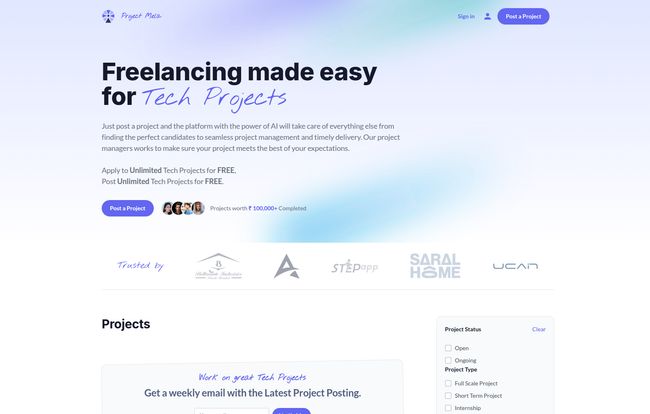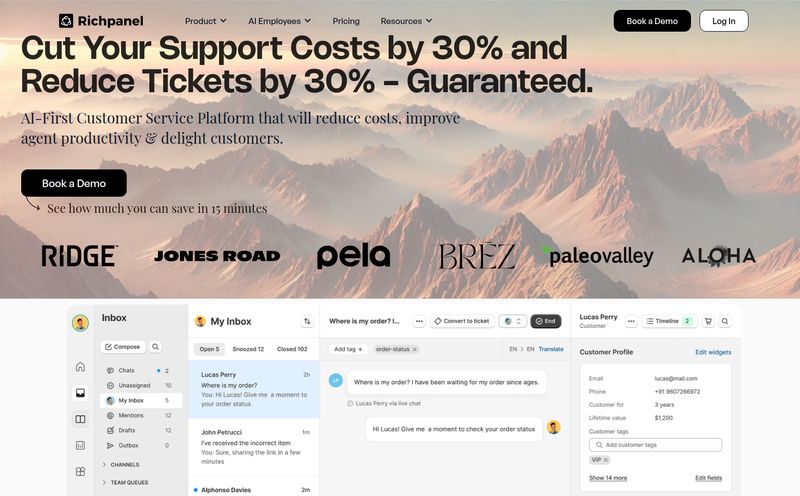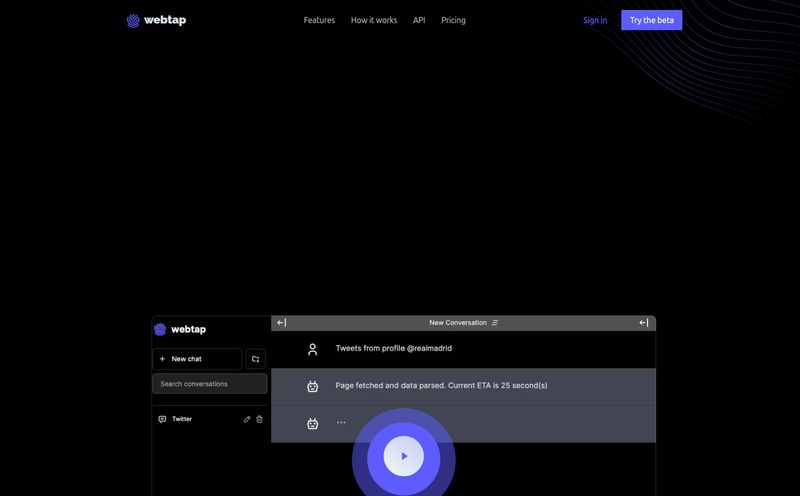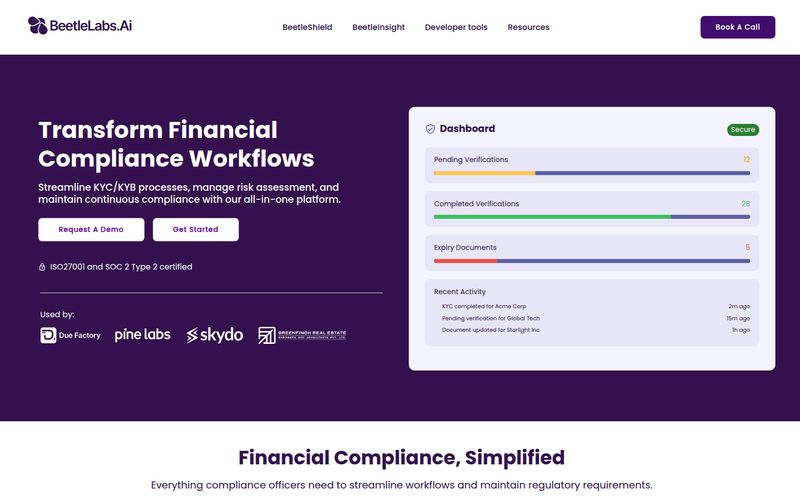I’ve been in the digital trenches for years. I’ve seen it all. The ghosting clients, the freelancers who promise the moon and deliver a lump of cheese, the endless back-and-forth that turns a two-week sprint into a six-month marathon. It’s enough to make you want to throw your laptop out the window. Every so often, a new platform pops up promising to fix everything. Most are just a new coat of paint on the same old broken-down car.
But then I stumbled upon something called Project Mela. The tagline, “Freelancing made easy for Tech Projects,” is bold. I’m naturally skeptical. But the twist? It’s an AI-Assisted Platform. The AI isn’t just suggesting keywords; it’s meant to be your project manager, your talent scout, and your security guard all rolled into one. Okay, now you have my attention.
So, What Exactly is Project Mela?
Think of it this way. Traditional freelance sites like Upwork or Freelancer.com are like massive, sprawling hardware stores. You need a specific screw? Sure, it’s in one of these 200 aisles. Good luck finding it, and hope you don't pick the one that rusts in a week. Project Mela wants to be different. It’s not a store; it’s a service. You tell them you’re building a cabinet, and they send over a vetted carpenter with the right screws, the wood, and a plan to get it done.
The platform is built for both sides of the coin. For clients, you post a project—anything from a full-scale app to a simple bug fix—and the platform’s AI supposedly takes over. It finds the right programmers, manages the workflow, and ensures things get delivered. For programmers, it's a place to find work, both paid and free, without the soul-crushing process of writing a thousand proposals. It sounds almost too good to be true, right?
The AI Project Manager: How Does It Actually Work?
This is where the magic (or the madness) happens. The core promise is taking the management load off the client’s shoulders. Let’s break down what that actually means.
AI-Driven Matchmaking for Your Tech Stack
When you post a project, you’re not just throwing it into a void. Project Mela’s system analyzes your requirements and scours its pool of talent for the right fit. You need a developer with experience in React, Go, and AWS? The AI is designed to match your project with programmers who have precisely those skills listed and, presumably, a track record to back it up. (Reminds me of the early days of dating apps, honestly. Swipe right on a tech stack? Kinda.) This is a huge departure from the typical model where you, the client, have to become a part-time HR manager, reading through dozens of profiles filled with jargon you might not even understand.
From Hiring to Deployment, All Under One Roof
This is the part that intrigues me most. Project Mela claims to coordinate the entire project lifecycle. That means managing communications, setting milestones, and handling the back-and-forth that usually eats up so much time. It's like having a digital general contractor for your tech build. The goal is for the client to have a single point of contact and for the programmer to have clear, managed tasks. This structured approach is also their main weapon against the biggest fear in freelancing: scams and project failures.

Visit Project Mela
What I Genuinely Like About Project Mela
After poking around and looking at what they offer, a few things really stand out. First, the emphasis on reducing client workload is huge. So many brilliant entrepreneurs and small business owners have their ideas stall because they don’t have the technical expertise to manage a dev project. This platform could be a lifeline for them.
Second, their direct approach to tackling scams. By acting as an intermediary and managing the process, they remove a lot of the risk. No more paying a deposit to a freelancer who promptly disappears. The platform itself has a vested interest in the project's success. This builds a layer of trust that's often missing. Roy Khanna, the CEO of Laundrytech.com, even said,
"This platform completed our project effortlessly and hassle free on time and exceeded expectations."
That’s a glowing review, and it speaks directly to this pain point.
And for the programmers? I love that it's a potential gateway for new talent. The testimonial from Mohit Grafita, a student at IIT Bombay, is telling. He earned money and got real-world experience. For a student, getting that first paid project is everything. The platform's inclusion of FREE projects also allows for building a portfolio, which is invaluable.
Let's Be Real: The Potential Downsides
Okay, let’s put the optimistic hat aside for a second. No platform is perfect. And one that relies this heavily on AI has some obvious hurdles.
Can You Really Trust an AI with Vetting?
My biggest question mark is the AI matchmaking. An algorithm can match keywords, skills, and experience levels, but can it gauge passion, problem-solving ability, or communication style? Some might argue that an AI can't possibly understand the nuance of their project. And they're not entirely wrong. There's a risk of imperfect matches. It’s a classic trade-off: you’re swapping the deep, manual dive of a personal interview for the speed and efficiency of automation. For some projects, that's a great trade. For a highly complex, mission-critical build? I'm not so sure.
The "Black Box" of Project Management
The other concern is a potential dependence on the platform. When the AI handles everything, do you lose a degree of control and visibility? The website boasts about projects worth over ₹100,000 completed, but there isn't a lot of public data on success rates or the specifics of the management process. You’re putting a lot of faith in their system. For control freaks like me, letting go can be tough.
The All-Important Question: What's the Pricing?
This is a bit of a tricky one, but in a good way. The platform loudly proclaims that it’s FREE to post a project and FREE for programmers to apply. And based on the interface, that seems to be true. There’s no upfront cost to get started, which is a fantastic way to lower the barrier to entry.
However, the project filters clearly show budgets ranging from ₹0 (for those portfolio-building projects) all the way up to ₹5000 and beyond. So, how do they make money? It’s not explicitly stated, but the most common model for platforms like this is to take a percentage or a commission from the total budget of paid projects. This is pretty standard stuff. It means they only get paid when you successfully launch and pay for a project, which aligns their goals with yours. It’s a smart model, and I much prefer it to monthly subscription fees.
Who is This Platform Really For?
I don't think Project Mela is for everyone, and that's okay. It seems laser-focused on a few key groups:
- Non-Tech Founders & Small Businesses: If you have a brilliant app idea but wouldn't know where to start with hiring a developer, this is for you. It abstracts away the complexity.
- Busy Managers: Got a small, specific tech task that needs doing but dont have the time to manage another freelancer? Post it here and let the AI handle it.
- Students & Junior Devs: This looks like a goldmine for getting your foot in the door. The mix of free and paid projects is perfect for building a portfolio and earning your first freelance income.
- Freelancers Who Hate Marketing: If you're a great coder but hate the sales pitch and proposal writing part of freelancing, Project Mela's model lets you focus on what you do best: building cool stuff.
Frequently Asked Questions (FAQ)
- Is Project Mela really free to use?
- Yes, it's free to post a project if you're a client and free to apply for projects if you're a programmer. The platform likely earns a commission on the budget of successfully completed paid projects.
- How does the AI matching work?
- The AI analyzes the technical requirements and skills needed for a project (like React, Python, AWS, etc.) and matches it with programmers in its network who have those specific skills and experience.
- What kind of tech projects can I post?
- Based on their filters, you can post a wide range of projects, from full-scale application development and building an MVP to smaller tasks, bug fixes, or website modifications.
- How does Project Mela prevent scams?
- By managing the project lifecycle and acting as an intermediary, the platform reduces direct, unsupervised contact where most scams occur. They coordinate the entire process, adding a layer of security for both clients and programmers.
- Can students and new programmers find work here?
- Absolutely. The platform seems very friendly to newcomers, with testimonials from students and the option to take on free projects to build a portfolio before moving on to paid work.
My Final Verdict on Project Mela
So, is Project Mela the revolution it claims to be? Maybe. It’s not a silver bullet that will magically solve every problem in the freelancing world. But it’s a smart, targeted solution to some of the most persistent and annoying problems that plague tech projects. The focus on AI-driven management is a bold step, and for the right kind of client and programmer, it could be a game-changer.
I'm genuinely excited to see how it develops. If they can nail the AI matching and maintain transparency, they could carve out a very valuable niche for themselves. For now, it represents a fascinating shift in how we think about getting tech projects done—less chaos, more coordination. And in this industry, a little less chaos is something we could all use.
Reference and Sources
- Project Mela Official Website (Note: based on email, actual URL may vary)
- Harvard Business Review: How AI Is Changing Project Management



